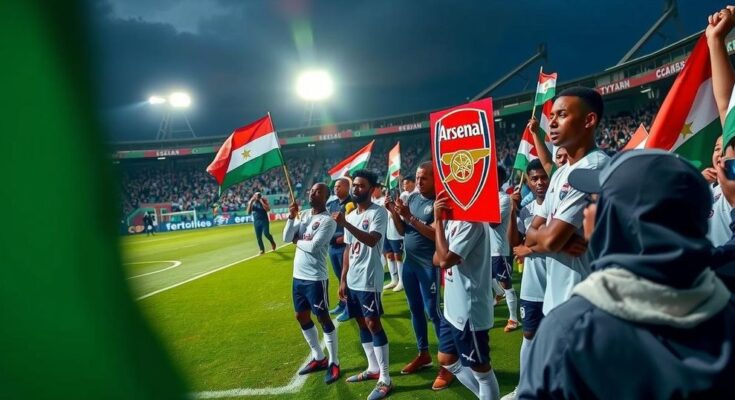Activists gathered outside Emirates Stadium to protest Arsenal F.C.’s sponsorship with Emirates Airlines, linking the UAE to escalating violence in Sudan. The groups accuse the UAE of supplying arms to the RSF, exacerbating the humanitarian crisis. They assert that Arsenal’s partnership implicitly involves them in these atrocities and call for its termination.
On the recent occasion of the Arsenal vs. Liverpool match, activists from London For Sudan and Action For Sudan convened outside the Emirates Stadium, advocating for Arsenal F.C. to terminate its sponsorship agreement with Emirates Airlines. This action was prompted by the United Arab Emirates’ (UAE) perceived complicity in Sudan’s deteriorating humanitarian situation. In a unified statement, the groups raised alarm over the surge in violence occurring in El Gezira, particularly following the defection of the Rapid Support Forces (RSF) commander, Abu Agla Keikil, to the Sudanese Armed Forces (SAF). The statement expressed, “In just 48 hours, over 500 men have been killed in a single village, and at least 37 cases of rape have been reported around Rufaa in Sudan’s El Gezira state. Tragically, some 130 Sudanese women are believed to have taken their own lives to avoid RSF violence.” Residents had previously cautioned that severe retaliation from the RSF could ensue, inciting fears of an unrelenting cycle of vengeance and increased civil unrest. Activists hold the UAE responsible for exacerbating these tensions, citing allegations that the UAE has been supplying arms to the RSF. This sentiment was echoed by Sudan’s Permanent Representative to the United Nations, El Harith Idriss Mohamed, during the UN Security Council’s meeting last April where he directly implicated the UAE in the ongoing conflict. However, the UAE has consistently dismissed these allegations as without foundation. Amidst the growing crisis, the protesters contend that the UAE, via its ownership of Emirates Airlines, is benefiting from the situation by gaining access to valuable Sudanese resources in exchange for its support of the RSF. They assert that Arsenal’s ongoing partnership with Emirates Airlines unfairly associates the club with these human rights violations. The activist groups articulated in their statement that, “Arsenal’s continued partnership with Emirates Airlines implicitly links the club to these atrocities,” accusing the UAE of “sportswashing genocide in Sudan.” The activists are mobilizing Arsenal fans and the broader public to support their demands for an end to Emirates sponsorship, urging a collective stand for Sudan through petitions and accountability measures directed at the football club.
The raising of concerns by UK activists regarding Arsenal F.C.’s sponsorship deal with Emirates Airlines stems from broader geopolitical and humanitarian issues linked to the UAE’s involvement in Sudan. The UAE has been accused of fueling the violence by providing arms to the RSF, contributing to a humanitarian crisis marked by violence, sexual assault, and civilian deaths. The defection of RSF members to the SAF has also instigated fear among civilians, escalating the situation further. The protests reflect a growing call for sports organizations to acknowledge and respond to the political contexts in which they operate, especially when tied to entities accused of human rights violations.
The recent protest by London For Sudan and Action For Sudan underscores the urgent need for accountability from international sports organizations regarding their sponsorships and affiliations. The allegations against the UAE signify an intersection of sports and global humanitarian crises, where actions in the sports industry can have profound ethical implications. If Arsenal F.C. were to reconsider its partnership with Emirates Airlines, it could set a precedent for responsible corporate governance in the realm of sports sponsorship.
Original Source: www.dabangasudan.org




